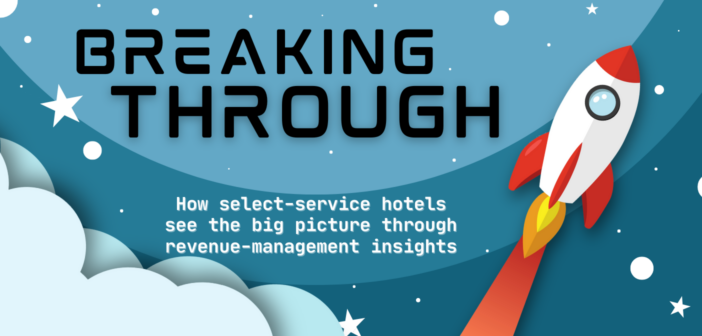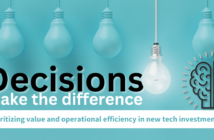How select-service hotels see the big picture through revenue-management insights
by GEOFFREY ROETHER
Select-service hotels have long embraced the challenge of a lean operating model and the efficiency needed to maintain profitability – and that’s something to be proud of. These operators understand the fine details of the hotel business, but they don’t always have time to leverage their knowledge against current events. They need tools capable of supporting their decision-making and the ability to make informed decisions that will drive revenue. Today’s technology enables this approach, with revenue management tools leading the charge.
Effective revenue management-related forecasting requires a bit of storytelling through data to set the foundation. Who are your guests? Where did they come from? What’s drawing them to the local area? Answering these questions provides operational and strategic benefits to any property, regardless of size or amenities. When hoteliers can answer these questions with reliable data, they operate with a better understanding of their property’s primary revenue drivers and how to leverage them for continued success.
Accessing this information to build a hotel’s knowledge base and tell better stories about its performance can often be challenging. In the past, hotels invested in limited solutions capable of interfacing with their property management system (PMS) to gain insight into performance and other metrics. While this PMS data still plays a key role, the perception that revenue-management solutions were too advanced for their needs has led many hoteliers in this segment to seek out alternatives. These limited-scope efforts often struggle to efficiently capture a holistic view of the performance and guest data that drive effective revenue management decisions.
Today’s revenue-management tools are more cost-effective and allow greater flexibility to fit these hotels’ needs. Thus, select-service hoteliers can attain capabilities similar to those of their full-service peers.
DATA-DRIVEN RESULTS
While many select-service hoteliers engage in relatively simple revenue management practices, such as adjusting prices based on occupancy and reactively following along with competitor rate changes, modern RMS automation capabilities allow hotels of all sizes and service levels to grow their revenue using more sophisticated strategies. However, limited-service operators have been historically hesitant to embrace these tools due to the perceived time and financial investment they require. In a sense, the most impactful capability provided by today’s RMS lies not in the scope and breadth of the insights an RMS can offer but rather in how today’s RMS utilizes automation to give valuable time back to hotel operators.
Select-service hotels may run lean, with fewer amenities than their full-service competition. However, every hotel can benefit from expanding its knowledge of a property’s performance trends.
Understanding, leveraging, and building off historical data is one of the primary ways hotels improve their revenue performance. Savvy hoteliers understand metrics like occupancy and average daily rate, while important, only provide a limited view into performance—and, in turn, limit strategic thinking around driving improvements. By embracing the monitoring of metrics like revenue per available room (RevPAR), which considers both room revenue and occupancy levels, limited-service hoteliers can shift their thinking away from occupancy-heavy “putting heads in beds” tactics.
Additionally, understanding and monitoring where their property stands among competitors is key. Hotels that monitor their revenue generation index (RGI), a figure calculated by dividing a property’s RevPAR by the mean RevPAR of local competition, are better equipped to understand whether performance changes are being driven by market forces or by internal efforts.
Moving away from an occupancy-heavy approach to a revenue management focus helps drive better revenue, limits operational costs, and allows for a greater emphasis on guest experiences. Most importantly, technology and automation make these more sophisticated revenue-boosting tactics achievable even in these comparatively leaner operating models.
TOOLS OF THE TRADE
Limited-service hotels have clear revenue goals but comparatively fewer ways to attain them, so they benefit heavily from long-term insights provided by revenue management data. A sustainable revenue strategy should include an equal focus on improving the rate and growing occupancy to allow both elements to balance each other out. Rather than accepting any and every guest, the core of revenue management is instead focused on finding the right guest – the one whose stay will generate the most revenue overall – and favoring them at all times.
While effectively managing this balance 24/7 is nearly impossible when done manually; automation now makes it easier than ever to deploy revenue-enhancing strategies. Limited-service hotels can leverage technology to ensure pricing and other closely related decisions drive optimal revenue within their market, all with guardrails to keep things within their control. Furthermore, revenue management technology is now becoming more broadly available across all hotels due to a wider selection of products and capabilities for hotels of all sizes. As these capabilities continue to be refined to fit the needs of hotels and travelers, the technology – and its ability to find a home in hotels – will improve.
Clinging to yesterday’s belief that evolved revenue management tools and practices are not applicable for limited-service properties is a losing mentality. New tools and technology make these approaches increasingly viable for hotels with lean operating models. With automation and the right supporting technology in place, limited-service hotels are poised to make significant strides in the pursuit of revenue optimization.
 Geoff Roether is a regional solutions engineer at IDeaS, where he serves as a trusted advisor to new and existing IDeaS clients as they navigate complex solutions around system integrations and optimal business practices. Geoff possesses a broad background in hotels, having spent time in sales and operations, with a particular focus on strategic hotel revenue and profit management. In his spare time, Geoff serves as a player/manager for the Savage Grizzlies in the Minnesota 50+ Baseball League, where he sports a 3-2 record as a pitcher and a .383 batting average as a hitter. While he has lost some velocity on his fastball, his curveball is still quite effective.
Geoff Roether is a regional solutions engineer at IDeaS, where he serves as a trusted advisor to new and existing IDeaS clients as they navigate complex solutions around system integrations and optimal business practices. Geoff possesses a broad background in hotels, having spent time in sales and operations, with a particular focus on strategic hotel revenue and profit management. In his spare time, Geoff serves as a player/manager for the Savage Grizzlies in the Minnesota 50+ Baseball League, where he sports a 3-2 record as a pitcher and a .383 batting average as a hitter. While he has lost some velocity on his fastball, his curveball is still quite effective.




